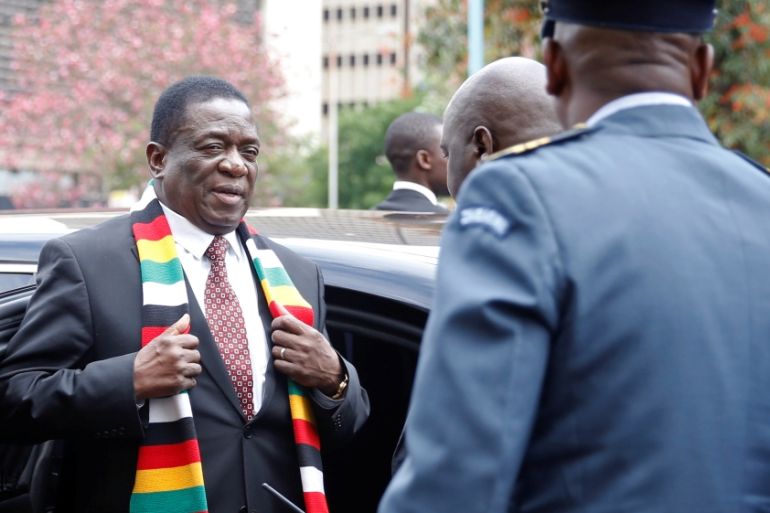Zimbabwe calls US envoy ‘thug’ as anti-government protests loom
Ruling ZANU-PF accuses Ambassador Brian Nichols of ‘funding disturbances, coordinating violence and training fighters’.

Zimbabwe’s ruling African National Union-Patriotic Front (ZANU-PF) has called the US ambassador to the country a “thug” and accused him of funding the opposition ahead of this week’s planned anti-government protests.
Patrick Chinamasa, a spokesman for ZANU-PF, told reporters on Monday that Ambassador Brian Nichols was involved in subversive activities to topple President Emmerson Mnangagwa’s government.
“He (Nichols) continues to engage in acts of undermining this republic and if he does so, if he continues engaging in acts of mobilising and funding disturbances, coordinating violence and training fighters, our leadership will not hesitate to give him marching orders,” Chinamasa said, without providing evidence.
“Diplomats should not behave like thugs, and Brian Nichols is a thug.”
The US embassy in Harare did not immediately respond to Chinamasa’s comments.
Political tensions are rising fast in the southern African nation after activists called for demonstrations on July 31 against government corruption, which they blame for deepening the worst economic crisis in more than a decade.
In the past week, Minister of Information Monica Mutsvangwa and Minister of Foreign Affairs Sibusiso Moyo have accused Western countries of sponsoring Hopewell Chin’ono, a prominent journalist known for exposing alleged government corruption, and Jacob Ngarivhume, an opposition politician behind the planned protests.
|
|
They have been detained for a week on allegations of organising the planned protests. The police have said they are looking for several other activists and politicians accused of mobilising protests.
Chinamasa on Monday urged party supporters to defend themselves from protesters and avoid a repeat of the deadly violence that followed post-election demonstrations in August 2018 and the January 2019 protests over a steep fuel price rise.
“No, this time no. Use any means at your disposal to defend yourselves,” Chinamasa said.
More than six people were killed following an army clampdown on protests in the aftermath of Mnangagwa’s election in 2018, while at least three people died last year when violent protests broke out following the government’s decision to increase fuel prices.
Organisers say this week’s protests will be peaceful.
In recent weeks, the US, Britain, European Union embassies and the United Nations have all criticised Zimbabwe for the arrest of journalists and political challengers.
Relations between Zimbabwe and the West were promising when Mnangagwa replaced Robert Mugabe after a coup in 2017, but have soured over the government’s human rights record.
Mnangagwa himself remains under US sanctions for alleged abuses, and relations between Zimbabwe and the West now echo the days of Mugabe, when Western ambassadors were routinely threatened with expulsion.
Last month, the government summoned Nichols after a senior White House official said Zimbabwe was among “foreign adversaries” using the civil unrest in the US following the death of George Floyd, an unarmed Black man in police custody, to interfere in US affairs.